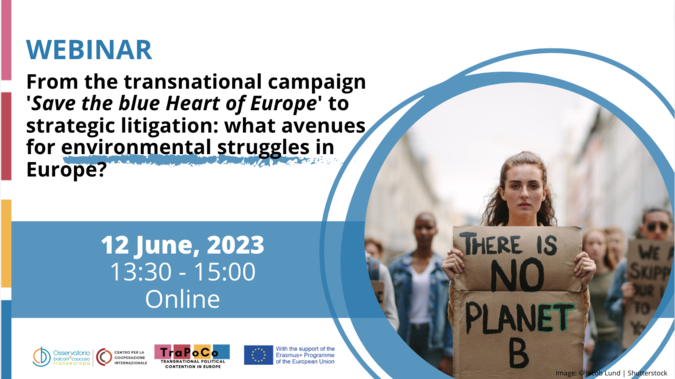Come dimostra la campagna transnazionale Save the Blue Heart of Europe per proteggere gli ultimi fiumi selvaggi d’Europa, le mobilitazioni ambientali transnazionali possono avere successo. Quali sono gli ingredienti del successo e quali sono le nuove strade per le lotte ambientali in Europa?
As the transnational campaign Save the Blue Heart of Europe to protect Europe’s last wild rivers shows, transnational environmental mobilisations can be successful. What are the ingredients for success and what are the new avenues for environmental struggles in Europe?
Two recent pieces of news have brought hope to environmental and climate movements in Europe and globally. The first news is from Albania, where the government has announced the establishment of a national park dedicated to protecting the Vjosa River. The Vjosa River is one of Europe’s last remaining wild rivers, free from dams and dikes. The decision to create a national park is a result of a decade-long transnational mobilization by various organizations and activists led by the Save the Blue Heart of Europe coalition. The case of the Vjosa River and the coalition’s success can serve as an inspiration and example for climate activists in other contexts.
The second news comes from the United Nations, where the General Assembly passed a historic resolution requesting the International Court of Justice to issue an opinion on the legal responsibilities of states in combating climate change. This resolution was initiated by law students from Pacific islands threatened by climate change. Although the Court’s opinion will not be binding on national courts, it has the potential to influence judges globally and impact the international legal system. Climate activists have welcomed this resolution as it broadens the Court’s mandate to include climate action and can clarify the legal obligations of governments. It also provides an additional tool for civil society to pursue legal challenges against governments on environmental issues.
In several European countries, a number of pro-environmental judgments resulting from forms of civic mobilization have already been signaling the ‘suppletive role’ of courts in climate matters in the face of government inaction for some years. While dissent and protests are increasingly criminalized and repressed across Europe, legal activism appears to be one of the remaining avenues for civil society to deploy the emancipatory power of law.
Many are looking with interest at the case of the Albanian river, especially in the Balkan region where hydroelectric power plants threaten many other rivers, and environmental struggles are not limited to this, as evidenced by the many mobilizations active in the area. For the countries of the region, mobilizations on the environment are also part of the process of European Union integration, with the EU playing an ambivalent and sometimes contradictory role.
Why is the Save the Blue Heart of Europe campaign a successful example of transnational collective action? How can the EU enhance its support for environmental initiatives in the region and promote participatory and inclusive decision-making processes in the Enlargement countries? Amidst growing criminalization and repression of dissent and protests in Europe, is legal activism truly one of the remaining powerful tools for civil society fighting for the environment?
An online conversation with:
Amelie Huber, Euronatur/Save the Blue Heart of Europe
Thomas Waitz, MEP, Group of the Greens/European Free Alliance
Jelena Pesic, researcher, University of Belgrade
Lucie Greyl, activist and researcher, A Sud association
Discussant: Charalampos Kontonis, Policy Advisor in Western Balkans Working Group, European Parliament
Moderation: Luisa Chiodi, OBC Transeuropa
Follow the event live on OBCT Facebook page .
The event will be held in English.
Speakers’ bio
Amelie Huber is freshwater project manager at Euronatur Foundation , Germany, where she helps coordinate the Save the Blue Heart of Europe campaign, an initiative aiming to halt destructive hydropower development in the Western Balkans. Before that, she spent several years researching hydropower conflicts in the Eastern Himalayan region of India. She holds a PhD in Political Ecology from the Institute of Environmental Sciences and Technology in Barcelona.
Thomas Waitz is a member of the European Parliament for the Austrian Greens and co-chair of the European Green Party. In his political work he focuses on environmental issues and sustainable agriculture, as well as a strong foreign and peace policy. He is particularly active on EU accession and the relations with Western Balkan countries. Thomas is an organic farmer, forester and beekeeper.
Jelena Pesić is Assistant Professor at the Department of Sociology, Faculty of Philosophy, University of Belgrade. She is interested in theoretical foundations of collective action and social movements, but also has experience in conducting surveys, quantitative data analysis, and collecting qualitative data on social movements, civic activism, and protests. She has been involved in two research projects related to recent civic protests in Serbia. In addition, she is experienced in international comparative surveys and research projects, such as “Eastern Enlargement – Western Enlargement. Cultural Encounters in the European Economy and Society after the Accession”, “Understanding Nascent Capitalism in Eastern Europe”, “Informal Relations Between Politics and Economy in Post-Socialism”.
Lucie Greyl. Anthropologist by training Lucie is a member of the Italian environmental Organisation A Sud since 2008 where she works as a project manager, research and trainer. Lucie is also president of CDCA – the Documentation Centre on Environmental Conflicts. Environmental and climate activists, Lucie coordinates the Giudizio Universale Campaign , promoting the climate litigation against the Italian State for insufficiency of the State climate measures, presented in court June 2021.
Contact information:
Rossella Vignola vignola@balcanicaucaso.org | segreteria@balcanicaucaso.org
The webinar is organised in the framework of the project TraPoCo. Transnational Political Contention in Europe co-financed by the ErasmusPlus, Jean Monnet Action of the European Union.






